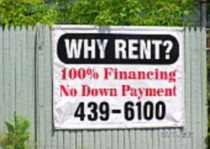Coach Mitch’s REFLECTIONS™
A most important skill for any investor, but especially for a real estate investor, is how to evaluate a transaction.
Just say, “Yes!”™
Quickly differentiating what may be a good deal from what is probably a marginal or bad deal, is a necessary skill.
We have all (me too) been guilty of being enthusiastic about having a property owner contact you who wants to sell their property, but is insisting that it is worth retail price. What to do? For me, it’s easy. Coach Mitch says, – Just say, “Yes.”™ Then, use Coach Mitch’s “famous $1 Option.”™ to take control of the property and market it.
My philosophy is to try to give the seller what they want – but to give it in a manner that makes sense for me. I can even agree to full retail, if I’m only optioning for $1. My risk is only $1, plus any marketing costs. I can create a transaction because the seller will almost always back off his price, thus allowing a profit to be made.
Speed matters
A seasoned real estate investor once told me that his goal is, within 15 seconds, to determine if he wants to do that particular deal. He had created a form that is filled out by the prospect, and he looks at certain numbers, like fair market value, FMV, and the principal, interest, property taxes, and insurance, PITI. He divides these to get a percentage, and if there is enough equity, he moves on to look at the rest of the application. If there is not enough equity, he puts the application aside.
It sounds cold, and it is, but this investor believes that being cold is the way to be fair. He mostly wants to be fair to himself. He no longer wants to look for a way to make something work. He has created a significant lead funnel, and either the property fits his cookie cutter – or it doesn’t.
Now, I have to admit that determining someone’s fate in a measly 15 seconds is not my idea of empathy. You are what you do. This methodology can turn you into a cold person. In my view, an investor should seek ways to help in a situation.
Many might think that this investor is simply looking out for his own interest. Of course, protecting one’s self is paramount. However, people are not stupid. If one party tries to take advantage of the other, usually no deal is struck and no one wins.
It’s not just numbers
This particular investor prized his time to such a degree that he came up with a simple question that, “cuts right to the chase and tells me what their hot button is.” And I agree. I have copied his tactic and I teach it to all my students.
Towards the beginning of the interview, he asks, “What are you looking to accomplish?” This simple question is never asked by anyone. The seller is caught off guard, and he blurts out what he actually wants.
Anyone who has sold for a living knows just how valuable the ‘hot button’ information is. By knowing the sellers real motivation, you don’t have to play salesman’s games. You can concentrate on questioning about the desired goal and then coming up with a way to Just say “Yes!”™ It is so much easier to create a winning plan when you know the seller’s real bottom line.
Why choose you
In addition, the seller is now emotionally open to you because you have demonstrated empathy. It is obvious that you care about the seller and his wants. You are definitely on second base. Displaying empathy is why you will be chosen to help this seller, versus anyone else. Selling, like buying, is mostly an emotional experience. We decide with emotion, and we justify that decision with logic. We do not buy, nor do we sell, on logic. Find and hit the emotional hot button and you will be involved in many winning transactions.
When getting tax delinquent property for 5% to 50% of the fair market value, the seller is not concerned with fixing a property or giving a further discount because of condition. Asking for more is akin to kicking a man when he’s down. He will turn on you and cancel the transaction. Remember, pigs get fat, but hogs get slaughtered.
For those who insist on numbers…
Some of the necessary knowledge for evaluating a deal
1. Most important is to determine the seller’s motivation.
“What are you looking to accomplish?”
2. The price.
“What are you (seller) needing to get?” Not wanting to get, but needing to get. There is a big difference between the two.
You can ask the seller, “Could you please explain how you came to that amount?” This sounds logical, but the question is clearly designed to elicit good information, much of it personal and situational.
3. “What is the amount of debt against the property?”
Equation: Price seller needs to get, less Property’s Debt = Owners Equity
Most property is sold at retail. These sellers are usually not motivated and often tell you, “It’s none of your business.” when asking a question. But, even if I was told the amount, it was usually too high for me to make a substantial profit. Therefore, I don’t recommend spending valuable time seeking “deals” by looking at properties being sold at retail.
After having too many interviews where people were selling at retail, I decided that I only wanted to speak with highly motivated seller’s. My answer was, Tax Delinquent Property and I created Coach Mitch’s “Ridiculously Simple System…”™
A Golden Nugget: A very high percentage of property that is tax delinquent is also free and clear of any liens. This means that the seller can sell the property for any amount that he chooses because there are no mortgages to pay off. It’s a distinct advantage.
4. Estimate the repair costs
This can be tricky. An inspection is certainly needed. A good question is, “What would you fix if you were going to stay in the property?” It is also effective to go down a list. “When was the roof last repaired?””How old are the windows?””When did you paint the porch?” This approach allows you to show that you are experienced and meticulous. The owner will now start telling stories about the property. Listening to stories helps you to create rapport with the seller. Don’t you like someone who listens to you talking about yourself and your situation?
5. Estimate the After Repair Value and the As Is Value
The As Is Value is the value you think the property is, right now, as it currently exists. The After Repaired Value is the value you place on the property after it has been updated with repairs. You determine ARV by using various sites online to look up comparable property data. Ideally, properties you are comparing should be similar in size, in style, and close in proximity. This is a wonderful exercise. Try it.
- Axiom: You guarantee your profit when you buy
By buying right, you can sell well.™ If you buy at fire sale prices, you can sell at wholesale. In real estate, safety is NOT location, location, location. It IS PRICE, PRICE, PRICE.
Coach Mitch’s “Ridiculously Simple System…”⁜ allows you to consistently speak to tax delinquents, “The most motivated of all motivated sellers.”™
See Coach Mitch’s “Ridiculously Simple System…” ⁜ for details.
Be right, do right,








Leave a Reply